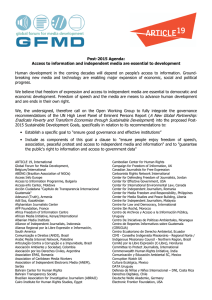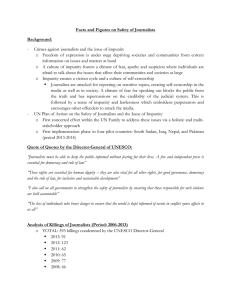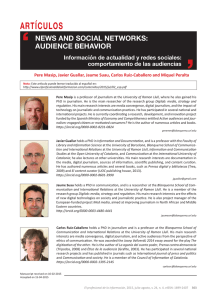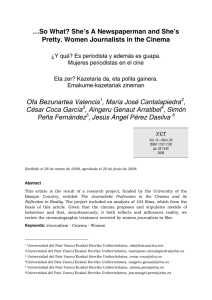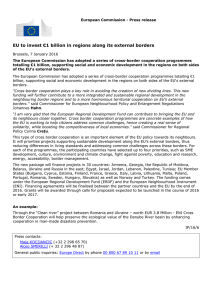news media: a men`s preserve that is dangerous for women
Anuncio
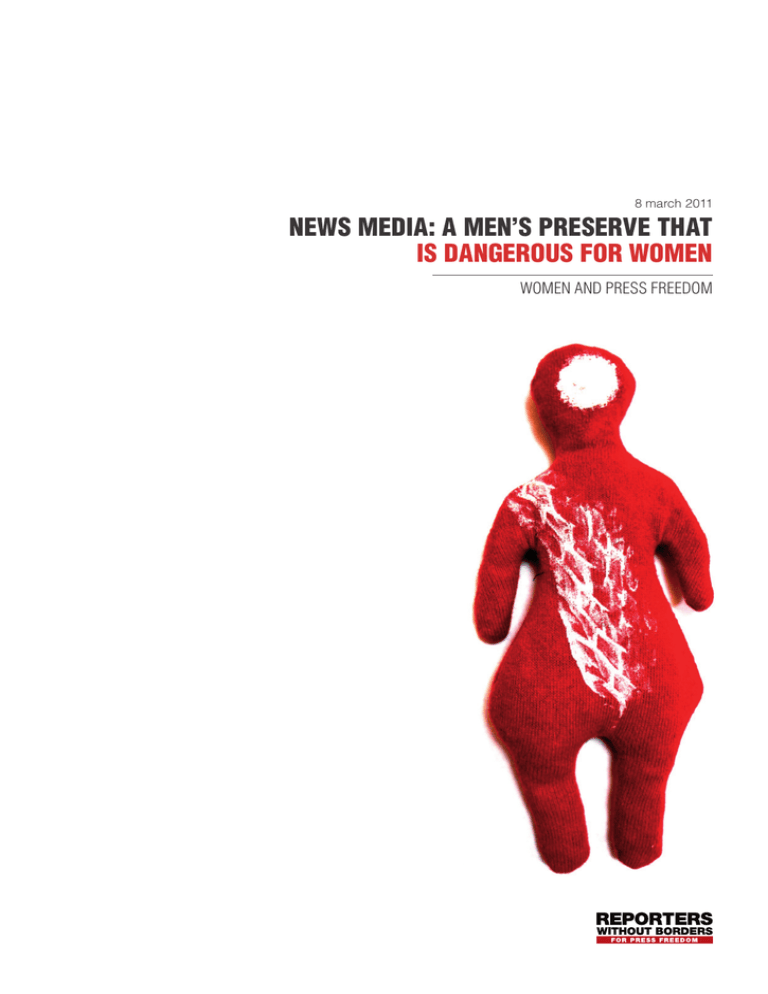
8 march 2011
News media: a men’s preserve that
is dangerous for women
WOMEN AND PRESS FREEDOM
N e w s m e d i a: a m e n’s p r e s e r v e th at i s d a n g e r o u s f o r w o m e n / 8 march 2011 ///////////////////////////////////////// 3
Equality Unfinished battle ..................................................................................................5
Difficulties of being a journalist in certain countries.......................................................6
Victims of violence, confinement and marginalization ..................................................6
Women, motors of free expression.....................................................................................7
Reporting and campaigning .............................................................................................8
Advantages of being a woman...........................................................................................9
Relatives who continue the fight ......................................................................................10
Assistance and support for exiles....................................................................................10
Recommendations...............................................................................................................11
Informations...........................................................................................................................11
The illustrations for this report come from the Séverine Bourguignon
exhibition “Dolorès” about discrimination and violence against women.
For more information in french: http://38ruepolonceau.canalblog.com/
N e w s m e d i a: a m e n’s p r e s e r v e th at i s d a n g e r o u s f o r w o m e n / 8 march 2011 ///////////////////////////////////////// 4
T
o mark International Women’s Day today,
Reporters Without Borders is releasing a report on
the problems of women who work journalists. It reaffirms several important principles, contains interviews with
women journalists throughout the world and describes all
the different problems they encounter, ranging from everyday discrimination to the most tragic forms of violence.
More and more women have been joining the ranks of
journalists in the past 20 years but they still tend to occupy
the lowliest jobs within the profession, with executive and
editorial positions usually continuing to be the preserve of
men. This clearly has an effect on the vision of the world
reflected by the media. It is still a largely male world, one
from which women are excluded, a world of men made
by men.
In many countries, women journalists and human rights
activists are the victims of violence, imprisonment, intimidation and censorship, just as men are. Some of them
may be preferred targets. The vulnerability of women journalists varies considerably from one geographic region to
another.
It is hard not to mention last month’s appalling assault on
Lara Logan of CBS News in Egypt, at the time of President Hosni Mubarak’s fall from power. Reporters Without
Borders offers her its entire sympathy. Even if such an incident is exceptional, it is symptomatic of the risks that
women run when they work as journalists.
N e w s m e d i a: a m e n’s p r e s e r v e th at i s d a n g e r o u s f o r w o m e n / 8 march 2011 ///////////////////////////////////////// 5
equality
Unfinished battle
women are needed in newsrooms for proper
coverage of the hidden half of humanity
Equality for men and women still represents a challenge
for media plurality. Aside from the basic principle of gender equality, women are needed in newsrooms for proper
coverage of the hidden half of humanity, because they
have the ability to deal with aspects to which men do not
have access.
quoted directly
Several studies show that the media provide little coverage of women, or that the coverage offers a very conventional if not degrading image of women – coverage that is
defended on the basis of polls indicating a lack of interest
on the part of the public. Women remain largely invisible.
A survey carried out by the Paris-based Association of
Women Journalists (AFJ) in 70 countries in 2006 found
that less than a fifth of the people quoted in articles were
women. The situation does not seem to have evolved since then, the AFJ said.
identified as a
family member
mentioned without
her profession
not named
identified as
a victim
17,7 %
Aside from ads, less
than a third of photos
showed women.
Of all the people
quoted in general
news reports
1 in 6 women were not named as against 1 in 33 men.
1 in 14 women were identified as a victim as against 1 in 21 men.
1 in 5 women were identified as a family member as against 1 in 16 men.
1 in 5 women were mentioned without her profession as against 1 in 20 men.
Fewer than 1 in 2 women were quoted directly, as against more than 1 in 3 men.
Source : http://www.femmes-journalistes.asso.fr/
29,9 %
N e w s m e d i a: a m e n’s p r e s e r v e th at i s d a n g e r o u s f o r w o m e n / 8 march 2011 ///////////////////////////////////////// 6
Difficulties of being a
journalist in certain
countries
Victims of violence,
confinement and
marginalization
It is not easy to make your way as a journalist and get access
to information when you are a woman in Cameroon. Agnès
Taile, the former host of “You have the word,” a phone-in
programme on Douala-based Sweet FM, said: “Women
in many sectors, including the press, are often just part
of the decor. On radio and TV, they are good for reading
press releases, for women’s magazines, or for covering
the beauty or health. Those who talk about politics, the
economy, science or technology are rare.” The “casting
couch” is common practice, not to speak of sexual harassment.
Authoritarian regimes, clans and religious groups often
treat women journalists harshly. Rwanda, Eritrea, Uganda, Sierra Leone, Afghanistan, Iran, China, Vietnam and
Thailand are all countries where they face the possibility
of violence or imprisonment.
The recent case of Agnès Uwimana Nkusi, the editor of the
privately-owned bimonthly Umurabyo, and one of her reporters, Saidath Mukakibibi, is one of several in Africa. A
Kigali court convicted them on 4 February on charges of
inciting civil disobedience,
causing divisions and denying the 1994 genocide,
Fellow
Cameroonian
After her editors kept giving her society-related stories to
cover, Rosine Nkonla Azanmene joined Dynamic and Caring
sentencing Nkusi to 17 years
journalist Rosine NkonFemale
Journalists
(JAFEC),
an
organization
created
by
the
in prison and Mukakibibi to
la Azanmene, who
Dakar-based journalist Liliane Nyatcha, who works for BBC
seven years. The authorities
works for YaoundéAfrica.
JAFEC’s
goal
is
to
develop
women’s
journalistic
skills
had been irked by their cobased Radio Tiemenie
and encourage them to take an interest in all subjects incluverage of several sensitive
Siantou, condemns the
ding, politics, economics and science.
issues including the June
“more or less perverse
2010 murder of Jean-Léonard
attitude of certain sourRugambage, the editor of the
ces who sometimes go
so far as to negotiate information (...) tending to orient the newspaper Umuvugizi, and the attempted murder of an
relationship towards sex.” Agnès added: “We also run up exiled Rwandan military officer, Gen. Kayumba Nyamwasa,
against discriminatory rules, such as a ban on women the same month in South Africa.
wearing trousers in certain government offices, including
the president’s office and the defence ministry. In northern In Eritrea (ranked last in the Reporters Without Borders
Cameroon it was hard for me to interview religious officials annual press freedom index), Yirgalem Fisseha has languished in prison since February 2009, when she and all
or to enter certain milieux reserved for men.”
the other employees were arrested during a raid on Radio
Bana. Originally from Adi Keyih, a town south of Asmara,
The segregation of women journalists obviously parallels near the Ethiopian border, and a graduate of the Asmara
the segregation of women in general. Some countries al- Teachers’ Training College, she is one of Eritrea’s few wolow them virtually no place at all in journalism. This is es- men journalists. Before the independent media were all
pecially so in Afghanistan, where “women are excluded closed in September 2001, she was an art critic for the
from television,” says French war correspondent Anne Ni- privately-owned weekly Addis Zemen. She also wrote for
vat. “The few women working as journalists in Afghanistan Hadas Eritrea, a state-owned daily, and Tigrita, a newsare regarded as worthless sluts,” she said. “Afghanistan paper linked to the National Union of Eritrean Youth and
continues to be a country where women do not have the Students.
right to speak.”
Abuse of women, including abuses sanctioned by tradition and genital mutilation, are subjects that often only women journalists can tackle but they run great risks when
N e w s m e d i a: a m e n’s p r e s e r v e th at i s d a n g e r o u s f o r w o m e n / 8 march 2011 ///////////////////////////////////////// 7
they do so. Four journalists – Manjama Balama-Samba,
Henrietta Kpaka of the Sierra Leone Broadcasting Service, Isha Jalloh and Jenneh Brima of Eastern Radio – were
kidnapped in Sierra Leone in February 2009 by members
of Bondo, a traditional secret society that practices female
genital mutilation.
After they were held overnight, Balama-Samba was stripped of her clothes and forced to walk naked down the
street. The journalists had been conducting a series of
interviews jointly with the Inter-African Committee on Traditional Practices for International Day of Zero Tolerance of
Female Genital Mutilation, celebrated on 6 February. The
Bondo group regarded their questions and comments as
a sign of disrespect for their traditions.
Women, motors of
free expression
In several countries that crack down on independent
journalism, it is women who have been pushing hardest
against the restrictions on free expression, often at the
cost of their own freedom.
Thai journalist Chiranuch Premchaiporn (also known as
Jiew), editor of the news website Prachatai and founder
member of the Thai Citizens Network, has been arrested
several times and is currently facing up to 70 years in prison on a range of charges for her objective coverage of
the political turmoil in Bangkok in 2010. Her website has
been repeatedly censored and has had to keep changing
its Internet address. It is another woman, Natalia Radzina,
who runs the Charter 97 news website in Belarus. She was
one of the leading victims of the crackdown on the protests that followed President Lukashenko’s disputed reelection last December. Freed after a month in detention,
she is still facing a possible 15-year jail sentence on a
charge of “participating in riots.” These two women are on
the frontline of the fight for free expression.
The young blogger Le Nguyen Huong Tra was arrested
last October after posting a blog entry accusing Vietnam’s
deputy public security minister of granting favours to a
beauty queen who was his son’s mistress. Tra covered
political issues with humour and her blog was one of the
most popular in Vietnam, where freedom of expression
has been subject to steadily increasing restrictions. She
was released in January pending trial and her blog has
been shut down.
Hla Hla Win, 26, was a video reporter in Burma for the Oslo-based Democratic Voice of Burma but since late 2009
she has been serving a 27-year jail sentence for covering
such subjects as villages that lack drinking water and child
soldiers who have deserted, and for interviewing Buddhist
monks about their imprisoned colleagues. She is one of a
total of 15 bloggers and journalists currently detained in
Burma, where the military government has been pursuing
people who send video and photos to exile news media
and opposition groups ever since the Saffron Revolution
in 2007.
It would be hard not to mention Hu Shuli, the star of investigative journalism in China, who has covered corruption, censorship of the government’s handling of the SARS
epidemic and the role of poor-quality construction in the
high death toll in the 2008 earthquake in Sichuan. She
resigned as editor of the business magazine Caijing in late
2009 after pressure from the owners, who wanted less
confrontation with the authorities. She is now running a
new publication, Century Weekly, where her fame seems
to be shielding her from judicial harassment.
N e w s m e d i a: a m e n’s p r e s e r v e th at i s d a n g e r o u s f o r w o m e n / 8 march 2011 ///////////////////////////////////////// 8
Reporting and campaigning
Journalism and social activism often go hand in hand.
In countries where the authorities try to cover up
poverty and injustice, exposing problems is tantamount
to demanding that they be addressed.
Jila Baniyaghoob has spent all her life fighting for journalism and free speech in one of the world’s most repressive
countries for the news media – Iran. Now aged 40, she has
worked for 16 publications during her 15-year career, including Capital, where she created a “Society” and “Women”
section. All of them have been closed by the authorities.
She has also been a war reporter in Lebanon, Afghanistan,
Palestine and Iraq.
In recent years, she has edited Focus on Iranian Women
(http://www.irwomen.info/), a website that campaigns
against laws that discriminate against women. Two other
well-known websites provide a similar combination of
news reporting and social activism: The Feminist School
(http://www.feministschool.com/), edited by Noushin Ahmadi Khorasani, and Change For Equality (http://www.
sign4change.info/), edited
by Parvin Ardalan, winner of
the 2010 Reporters Without
Borders Netizen Prize.
everything that it has always tried to cover up. The government wants people to believe there are no problems, that
everything is fine in public health and education. By publishing our articles, we try to combat these lies, we try to
let the world know what is happening in Cuba.”
Women are fighting in Tunisia as well. Sihem Bensedrine
created the Monitoring Centre for Press Freedom, Publishing and Creation (OLPEC) and, together with her husband, Omar Mesteri, founded Radio Kalima, which has repeatedly been targeted by the political police. Its premises
have been attacked and placed under seal and its equipment has been seized. Its satellite broadcasting was also
stopped but it continued as a web radio. Bensedrine has
been jailed, harassed, forced into exile and targeted by the
Ben Ali regime’s
smear campaigns.
{...}
She returned to Tunisia the day that
President Ben Ali
fled the country, 14
January 2011.
under Ben Ali, we were seen as
pariahs by the regime. The former
president regarded demands and
denunciation as acts of rebellion
against him in person. {...}
Being a woman, journalist
and press freedom activist
is all one and the same thing
for Baniyaghoob, who began at a very early age to combat her country’s paternalist
culture. It is no surprise that women have played a leading role in the anti-government demonstrations that have
been taking place since 2007. The Ahmadinejad administration’s reactionary policies towards women have pushed
them into the front-line of the resistance. The victim of both
violence and imprisonment, Baniyaghoob was recently
banned from working as a journalist for 30 years.
This is how Magali Norvis Otero Suárez, 47, a Cuban dissident journalist based in Havana (Hablemos Press), described her work as an independent journalist in Cuba: “Our
role as journalists is to resist the Castro regime and expose
“Women got special treatment under Ben Ali,” she
said. “As press freedom activists, we were seen as pariahs
by the regime. The former president regarded demands
and denunciation as acts of rebellion against him in person. We suffered every kind of repression. We were deprived of resources, communication and transport. We were
under constant police surveillance and exposed to physical attacks. The regime’s newspapers treated us as sluts
and prostitutes. We were accused of holding orgies. I was
the victim of all-out smear campaigns. You have to understand that the status of women was the Ben Ali regime’s
showcase. So we were doubly guilty. We were the ones
contradicting the official propaganda.”
N e w s m e d i a: a m e n’s p r e s e r v e th at i s d a n g e r o u s f o r w o m e n / 8 march 2011 ///////////////////////////////////////// 9
Advantages of being a woman
Several women from countries such as the Philippines and Cuba gave a very different kind of account
of how they have been able to make their way as journalists and even turn the fact that they are women to
their advantage.
Invisible woman, undercover reporter
Philippine writer and journalist Marites Dañguilan Vitug,
who heads the board of the online news magazine Newsbreak (www.newsbreak.ph), said: “I would say that as a
woman I have a certain facility for doing this job. People
trust me more readily, I get information more easily than I
think my male colleagues do. But it was hard starting out. I
remember my editor at Business Day, where I began in the
1980s, bluntly asking me to choose between my family life
and my work. In fact I chose both. Things have changed a
lot since then and women are in a lot of key positions. The
publishers of two big dailies, the Philippine Daily Inquirer
and Philippine Star, are women, Letty Jimenez and Amy
Pamintuan. The news chiefs of two leading TV stations are
women – Jessica Soho at GMA7 TV and Luchi Valdez at
TV5.”
A similar view was voiced by Magali Norvis Otero Suárez.
Otero covers “the news but also the system, human rights
violations, the prisons and so on” – subjects that irritate the
Castro regime. She thinks it is less dangerous for a woman
to be an independent journalist in Cuba than a man. “They
don’t hit women when we go to cover demonstrations. The
police are less violent towards us.”
French war correspondent Anne Nivat, winner of the Albert Londres Prize, has covered Chechnya, Afghanistan
and Iraq: “It has been easier for me as a woman to do my
work because women count for nothing in Iraq and Afghanistan and no one pays them any attention. You can see
without being seen. Unlike our male colleagues, a woman
journalist can pass relatively unnoticed. She can get through
checkpoints. No one mistrusts her. But it is all to do with my
method of working, total immersion in the local population.
I dress like a local woman, with a burqa that allows me to
go though very hostile environments. In countries at war, the
population is always caught in the crossfire, between insurgents and regular army. While the men are at the front, the
women try to survive. I have had privileged access to women thanks to men who have brought me into their families.
Countries at war tend to turn in on themselves and become
very conservative. Women’s rights always suffer.”
N e w s m e d i a: a m e n’s p r e s e r v e th at i s d a n g e r o u s f o r w o m e n / 8 march 2011 ///////////////////////////////////////// 10
Relatives who continue
the fight
Assistance and support
for exiles
Reporters Without Borders would also like to pay tribute to
the wives of journalists and human rights activists who have
been killed or imprisoned. In many cases, they married
not only a man but also a cause, and they have continued
the fight on behalf of their husband. In Cuba, the Ladies in
White – the wives and mothers of dissidents who have been
jailed since the 2003 Black Spring crackdown – march every Sunday to demand the release of the Castro regime’s
prisoners of conscience.
Threats and violence force many women journalists to flee
into exile. Of the 213 cases of financial assistance and
support for asylum requests handled by the Reporters Without Borders Assistance Desk in 2010, between 10 and
15 per cent concerned women, most of them from Iran,
where there has been a ruthless crackdown on government opponents, human rights activists and journalists
since President Mahmoud Ahmadinejad’s disputed reelection in June 2009.
Sri Lanka’s Sonali Samarasinghe Wickrematunga, a lawyer
who has had to flee abroad, continues to demand the truth
about the death of her husband, Sunday Leader editor Lasantha Wickrematunga, who was gunned down in January
2009. Sandya Ekneligoda recently complained to the Sri
Lanka’s authorities about the lack of any significant police
investigation into the disappearance of her husband, Lanka-e-News cartoonist and journalist Prageeth Eknaligoda,
who went missing in Colombo in January 2010. In the Philippines, the families of the 32 journalists who were massacred by members of a provincial governor’s private militia
on the southern island of Mindanao continue to demand
justice.
As regards protecting women journalists, the priorities for
Reporters Without Borders are:
In China, Liu Xia has been under house arrest since October 2010, when the Nobel Committee announced that it
was awarding the peace prize to her husband, the jailed
dissident and human rights activist Liu Xiaobo. Her fate
shows that the government’s persecution of dissident activists extends to their families and loved-ones. When Liu
Xia managed to connect to the Internet for a few minutes on
17 February, she told a friend that she felt “miserable,” that
the family was being held “hostage” and that “no one can
help us.” She was last able to visit her husband in prison in
October 2010. Since then she has been kept in complete
isolation.
Blogger and human rights activist Zeng Jinyan, whose
husband, the well-known human rights activist Hu Jia, has
been jailed since December 2007, is herself under house
arrest and subject to constant police surveillance. She and
her husband jointly founded Loving Source, a now closed
NGO that cared for the orphans of peasants who had died
as a result of exposure to HIV-contaminated blood. The
Chinese authorities do everything possible to cut off dissident activists and journalists from the outside world in order
to demoralize them and those close to them.
finding a safe refuge when the journalist’s physical safety is threatened
making the authorities aware of the issues involved
more jobs for women in the media, the disparity in many
countries being so great that more representation would
necessarily increase acceptance of women journalists and
reduce the number of cases of violence against them.
At the initiative of its vice-president, Safia Otokoré, the government of the French region of Burgundy has decided
to establish a Residence for Women Journalists in the region’s capital, Dijon. The project will accommodate three
women refugee journalists at a time for periods of up to
a year and will provide them with training, medical and
psychological follow-up and assistance with administrative procedures and applications. Reporters Without Borders will help to choose beneficiaries and indentify their
needs.
Reporters Without Borders supports the idea that several countries should set up specific programmes for the
protection of women journalists. This should be done in
coordination with women’s rights groups.
N e w s m e d i a: a m e n’s p r e s e r v e th at i s d a n g e r o u s f o r w o m e n / 8 march 2011 ///////////////////////////////////////// 11
Recommendations
On the basis of the interviews carried out for this report.
Reporters Without Borders recommends :
Establishing specific programmes for the protection of
women journalists.
Reinforcing cooperation between women’s rights organizations and press freedom organizations
Creating residences for women journalists.
Supporting entities that provide journalism training specifically for women.
Creating women journalists’ associations and promoting
exchanges with organizations already existing in other
countries.
N e w s m e d i a: a m e n’s p r e s e r v e th at i s d a n g e r o u s f o r w o m e n / 8 march 2011 ///////////////////////////////////////// 12
Informations
Choisir la Cause des Femmes: http://www.choisirlacausedesfemmes.org/
The Paris-based NGO Choisir la Cause des Femmes was created in July 1971 by the philosopher and writer Simone
de Beauvoir (its first president), the lawyer Gisèle Halimi, the French Academy member Jean Rostand, the novelist
Christiane Rochefort and the biologist Jacques Monod (a winner of the Nobel prize in medicine).
It combats all forms of discrimination against women.
International Women’s Media Foundation : http://www.iwmf.org/
The International Women’s Media Foundation is organizing a conference in Washington DC from 22 to 25 March 2011
for leading media women from all over the world to discuss gender barriers in the news business. A global report on
women in the news media will be released during the conference.
The Paris-based Association des Femmes Journalistes: http://www.femmes-journalistes.asso.fr/
The Asian Human Rights Commission has released a new version of “Ethics in action - Women Speak Out.” It
contains 43 interviews with women from India, Sri Lanka, the Philippines, Burma, Indonesia, Nepal and Bangladesh:
http://www.ethicsinaction.asia/archive/2010-ethics-in-action/vol.-4-no.-5-october-2010.
International Secretariat
Reporters Without Borders
47 rue Vivienne, 75002 Paris, France - Tel: 33 1 4483-8484 - Fax: 33 1 4523-1151 - Website: www.rsf.org - E-mail: [email protected] - Ambroise Pierre - Africa desk:
[email protected] - Benoît Hervieu - Americas desk: [email protected] - Vincent Brossel - Asia desk: [email protected] - Johann Bihr - Europe desk: [email protected]
Soazig Dollet - Middle East desk: [email protected] - Lucie Morillon - Internet desk: [email protected] - Press contact: [email protected]
Reporters Without Borders is an international press freedom organisation. It monitors and reports violations of media freedom throughout the world.
Reporters Without Borders analyses the information it obtains and uses press releases, letters, investigative reports and recommendations to alert public
opinion to abuses against journalists and violations of free expression, and to put pressure on politicians and government officials.
General secretary : Jean-Francois Julliard l Chief Editor : Gilles Lordet
